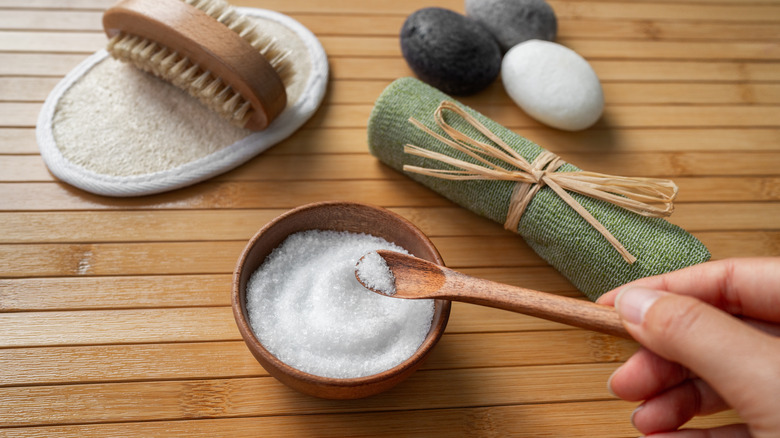The Real Health Benefits Of Epsom Salts
Epsom salt is a common remedy for alleviating constipation, sore muscles, and body aches. According to Mayo Clinic, it can be used topically, ingested, or added to bathwater. "In an Epsom salt bath, the magnesium ions are released in the water, which may help the body use up glucose and lactic acid, and may provide some relief from soreness, inflammation, and muscle cramps," explained wellness coach David Chesworth in an interview with Real Simple.
This natural remedy takes its name from a saline spring in Epsom, England. Back in the 17th century, it was used for its laxative effects, according to Apartment Therapy. Over the years, people realized that it may also relieve gout symptoms and other aches. Some say that Epsom salt can exfoliate the skin, reduce bloating, and improve sleep, but there's a lack of clinical data to prove these claims are scientifically accurate. "When you really look at the research and the studies that are out there, there isn't anything overwhelming saying that it's really effective," Dr. Bret C. Jacobs, assistant professor of orthopedic surgery at NYU Langone Medical Center, told Health.
While Epsom salt seems to have its benefits for physical health, experts suggest it may provide mental health benefits as well.
Epsom salt for relaxation and mental health
One of the main benefits of Epsom salt lies in its ability to relax the mind and body. This compound may relieve stress and anxiety, ward off depression, and soothe sore muscles, notes the Cleveland Clinic. Magnesium sulfate, the active compound in Epsom salt, consists of magnesium, sulfur, and oxygen, according to Healthline.
Magnesium, an essential mineral, may improve your body's ability to cope with stress and create neurotransmitters that support mental wellbeing. Low levels of this nutrient can contribute to depression, fatigue, irritability, insomnia, and memory problems, says James Greenblatt, chief medical officer at Walden Behavioral Care in Waltham and assistant clinical professor of psychiatry at Tufts University and Dartmouth College (via Integrative Medicine for Mental Health). Based on this information, it's fair to assume that magnesium sulfate has similar benefits.
All in all, Epsom salt baths may help relieve stress and some health professionals swear by magnesium sulfate for relaxation and stress reduction. "In a warm bath, our vessels in our skin dilate and allow for enhanced absorption of magnesium salts throughout the skin. It is a little-known fact that magnesium is much better absorbed transdermally rather than through the GI tract," dermatologist Dendy Engelman told Byrdie.
Epsom salt may help alleviate constipation
Another common way Epsom salt is used is to alleviate constipation. Due to its magnesium sulfate content, it can have a laxative effect, as it draws water into the bowels and stimulates peristalsis or the muscle contractions that move food through the digestive tract. Generally, it's recommended to mix 2 to 6 teaspoons of Epsom salt into a glass of water and drink it immediately, according to the National Institutes of Health. However, always check the label of your Epsom salt packaging to ensure it's safe for consumption. Some Epsom salt products also include ingredients like essential oils that are not meant to be consumed, but used in a bath only.
It's important to note that most of the benefits of Epsom salt are purely anecdotal (via Healthline). As far as constipation goes, there are safer ways to address this problem and keep your digestive system healthy. "The most important thing is to get to the root cause of your constipation and support your gut health in a natural and safe way," Robin Rose, board-certified specialist in gastroenterology and internal medicine, told Real Simple. The ongoing use of Epsom salt as a laxative can negatively impact electrolyte balance and cause kidney damage.



